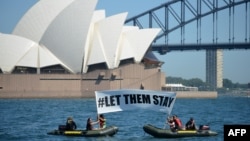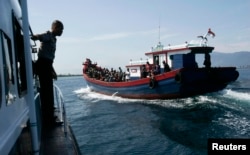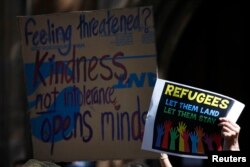Australia votes in a federal election in July, and immigration will be a key issue. Immigration Minister Peter Dutton has stoked controversy by saying illiterate and innumerate refugees would take Australian jobs. Critics say his comments were racist. But immigration played a key part in the election of the center-right coalition in 2013.
Opinion polls have both major parties neck-and-neck as campaigning continues ahead of Australia’s federal election. While the economy is the critical issue facing most Australians, immigration is another key battleground in the fight for votes.
Previous elections have shown that tough talk on asylum seekers and border controls do appeal to large numbers of voters.
Speaking on Australian radio, Immigration Minister Peter Dutton said he was opposed to resettling more unskilled migrants.
“Well for many people, they will not be, you know, numerate or literate in their own language, let alone English, and these people would be taking Australian jobs, there is no question about that. And for many of them that would be unemployed, they would languish in unemployment queues and on Medicare and the rest of it. So, there would be a huge cost, and there is no sense in sugar-coating. That is the scenario,” said Dutton.
Australia offers resettlement to just under 14,000 refugees under official humanitarian programs each year. The Australian Greens, who would expect to attract about 10 percent of the vote, want to increase the annual intake to 50,000.
Its leader, Richard Di Natale, said the immigration minister’s comments about refugees were indefensible.
“This smacks of racism. It smacks of bigotry. We launched our policy with a young Hazara Afghan refugee, a tiler, who four days after he was out of detention was employed doing work in the construction industry. Within a year, this young man was employing 30 people in the tiling business. They're the sort of people that Peter Dutton doesn't want in this country. Well, we want them,” said Di Natale.
Modern Australia has been built by successive waves of migrants. Chinese miners were a feature of the gold rush days in the 1800s, while more recently large numbers of settlers from Britain, New Zealand, Greece and Italy have arrived. There is also increasing migration from India and China.
About a quarter of the Australian population was born overseas, but election analyst Antony Green said that despite its diversity, much of the country is wary of immigration, especially when it involves unauthorized asylum seekers arriving by boat.
“Within the Australian population there is a significant proportion that do not like immigration anyway, and those people get particularly motivated about boat arrivals. Boat arrivals is seen as losing control of the borders and the previous Labor government was savaged for being unable to stop the boats. John Howard stopped the boats after 2001, the current government has stopped boat arrivals. There is all sorts of consequences from that with people locked up on Manus Island and Nauru, but in general the public does not want boats arriving and they are quite happy to ignore the whole issue as long as no more boats arrive,” said Green.
Australia has been sending asylum seekers who arrive by boat to camps in the South Pacific. Others are towed out of Australian waters by border patrols. The government says the policy stops migrants risking their lives at sea and secures Australia’s territory. The uncompromising measures have the broad support of the opposition Labor party, despite some internal dissent. Both major parties know that backing away from the policy would cost them votes.
But Bill Crews, a Uniting Church minister in Sydney, said the shameful treatment of asylum seekers in offshore camps should be subject to a judicial inquiry.
“I think it is going to head further downwards. There will be more scandals where people like has been the rapes in the centers and the murders, so there will be more people affected like that, and we will turn our backs on them. But in the future these things will build up and up until there will be a royal commission to look at what really happened,” said Crews.
Australians go to the polls on July 2.






